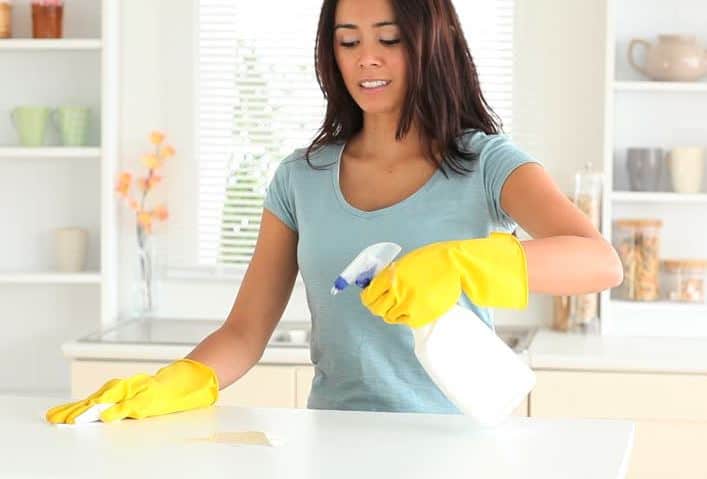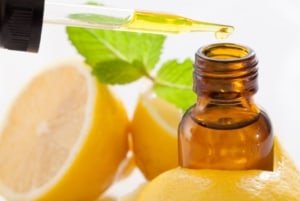Natural Cleaning Products: 6 DIY At Home Cleaning Recipes

Many people are opting out of supermarket aisle cleaning products, and going the more natural route. Making your own cleaning products has never been easier! Whether you choose to do it for the environment, or to save money, or simply as a way to be more involved and hands-on in the household – making your own natural cleaning products (and using them, of course) can be satisfying and rewarding. This is our post on DIY natural cleaning products.
This doesn’t have to be as complex as your mind may be attempting to make it. The core is pretty solid, and the idea is simple. There are companies which tend to use certain substances and chemicals just because they are much cheaper to manufacture and obtain in this age. Other substances can be used in their stead – ones which are cheaper, more effective, and more ecologically-sustainable – but most product manufacturers won’t be the ones to let you in on that little nugget of information. They’d much rather you buy their products, understandably so.
And they have a point, don’t they? When we are at the supermarket, or otherwise grocery shopping, what we are looking for is fastness, inexpensiveness, and convenience. We value those above many other things when we’re shopping. Sure, there are some items which we will always be loyal to – such is the power of brand. But otherwise? It is all on the table, and we have the power to choose.
No matter the reason for your wanting to go DIY, we’re here to try and give you a hand. This is not the ultimate guide to DIY natural cleaning, of course. But hopefully it will serve as a sort of starting point from which you can advance and become more knowledgeable.
How To Make Natural Cleaning Products
As I see it, before the “How” comes the “Who.” In other words, who is it that is going to be making these products and using them? It makes a difference. If you know, for instance, that the person who will be using these products has sensitive skin or certain recessive qualities (allergy-wise), then you may want to rethink this, that, or the other ingredient.
See where I’m going with this? Safety first. Just because a product is natural and its ingredients are natural, doesn’t mean it can do no wrong or cause no harm. As a wise man (or woman) once said: cyanide and tobacco are also perfectly natural…
I feel the best way to make your own natural cleaning products is with gloves, with proper containers, with a ventilated area, and basically with caution. Ordinarily, you’ll want to have items like a measuring cup, a small bucket, tub or bottle, a funnel, a stirrer of some kind, and the substances which the recipe calls for. Make sure your work space is neat and clean, and that you have everything at hand.
Industrial products – or in other words, commercial products – are exactly that: commercial. They have a well-oiled machine of public relations and advertisements greasing the wheels of business, marketing, sales, supply, and demand. But it doesn’t have to be that way, if only you can learn to take advantage of these natural products – some of which are probably located underneath your sink at this very moment!
Top 5 Chemical-Free Cleaning Ingredients

Lemons for DIY cleaning.
Well, to be clear, these are not so much chemical-free as they are industrial chemical-free. Substances like essential oils, vinegar, and lemon are all on this list, and you can bet your bottom dollar that they have chemicals in them. The difference lies in the fact that these are not chemicals which are manufactured for industry and production.
They are not a means to an end, but are naturally present in the substance in question. Nothing was added artificially or manipulated in any unnatural way, which is why items like vinegar and lemon are considered chemical-free in this context. My top 5 chemical-free cleaning ingredients are:
- Baking soda – this ingredient can remove stains and odors like a pro. Mixing it with water is great, but it has many other uses as part of a formula.
- Lemon – the lemon’s acid is practically a natural kind of bleach. You can put the entire fruit to good use, from the peel to the juice.
- Vinegar(s) – another wonderful cleaner which relies on its heavy acid content, white vinegar and apple cider vinegar can also be used for different cleaning needs.
- Essential oils – some of nature’s most powerful substances. From peppermint to tea tree to orange and more, these are a real tour de force of cleanliness and productivity.
- Salt – when added to formulas which have acid in them (like lemon or vinegar) there is a significant and beneficial chemical reaction which takes place and acts as a great cleaner.
So, these are a top 5, but they are just the tip of the DIY iceberg. Do some research and see where it takes you, because it could very well be that you’ll discover a hack which will save you some time, money, energy, and frustration.
6 DIY At Home Cleaning Recipes

Citric acid naturally cleanses white laundry.
The following are 6 DIY at-home cleaning recipes:
- Floor cleaner – fill a bucket with warm water, a cap-full of vinegar, several drops of lemon essential oil. Not for use on marble floors, but others should be fine with this cleaner. Consider testing it in a corner first.
- Toilet cleaner – place baking soda on or inside the bowl, where you would normally use an ordinary industrial cleaner. Add vinegar on top of the baking soda, and proceed to brush with a toilet brush.
- White laundry helper – when washing white clothes in a washing machine, add half a cup of citric acid to the designated detergent compartment of your washer. Again, best to test this out on something like a white sheet first.
- Dishwasher cleaner – add a cup of vinegar to the proper compartment. Next, activate the washer on “intense” (high temperature) mode, or “full” program.
- Removing limescale from an electric kettle – fill the kettle halfway through, add two tablespoons of citric acid, and boil the water as usual. When done, carefully pour out the boiling water, and re-boil the kettle with fresh water to get rid of any odor or residue.
- Grease remover – in a bowl or container, mix two cups of hot water with half a teaspoon of baking soda and a quarter-spoon of liquid soap. Place the liquid in a spray bottle, and use while still warm for best results. Spray and scrub using a rough dish sponge or a magic sponge
There are literally thousands of DIY cleaning recipes and hacks out there. If the six I listed here don’t pique your interest, don’t make the mistake of thinking this is where your journey should end. There are so many potent and beneficial substances out there, natural and perfectly useful. Plus, the ingredients used in DIY cleaning products are all readily accessible and highly affordable.
Conclusion
We all do what we can for the environment. Some say that people who use a canvas bag, or who make their own DIY products are fooling themselves into thinking that these actions make a difference. I am not about to judge one way or another. Personally, I am of the opinion that the butterfly effect is always there. One seemingly tiny action in the present can make a world of difference in the future.
This is why I am into DIY products at large, with cosmetics and cleaners being my primary interests. I don’t use them all the time, of course. But I am always interested in learning new hacks, even if I don’t get to implement them immediately.
People are suckers for convenience, and I am not excluding myself from that lot. But I have found that once you get into the habit of DIY cleaners (or cosmetics, for that matter), it can save you time and money, and make it so you know what you are using. There is something very practical and useful about making your own products. Also it is usually cheaper and safer in the long run.
Bottom line – don’t knock it till you’ve tried it. DIY cleaning products are an entirely viable substitute to the chemical-laden products we’re used to. All it takes is an initial short-term commitment, and perhaps a few test runs. It could very well be that you find you are partial to the bathroom-related DIY cleaners, but are not too thrilled with the kitchen-related ones, or vice versa. However it plays out, at least you gave it a shot, and you can have more knowledge of the industry and its alternatives going into the future.


